疯狂英语-口语突破-突破句型完整版
- 格式:rtf
- 大小:1.80 MB
- 文档页数:96
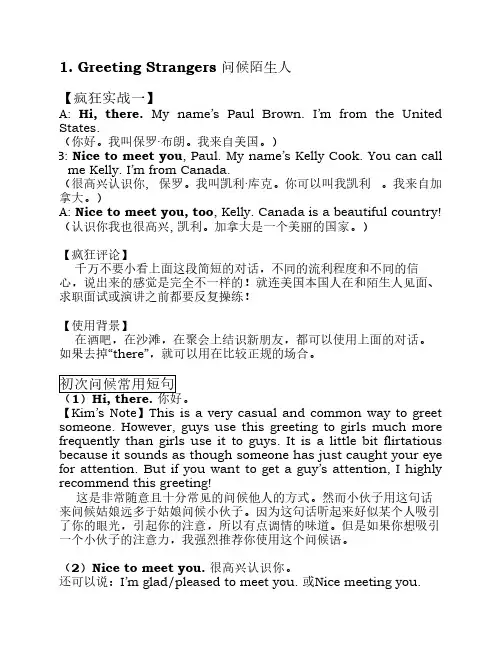
1. Greeting Strangers 问候陌生人【疯狂实战一】A: Hi, there.My name’s Paul Brown. I’m from the United States.(你好。
我叫保罗·布朗。
我来自美国。
)B: Nice to meet you, Paul. My name’s Kelly Cook. You can call me Kelly. I’m from Canada.(很高兴认识你, 保罗。
我叫凯利·库克。
你可以叫我凯利。
我来自加拿大。
)A: Nice to meet you, too, Kelly. Canada is a beautiful country!(认识你我也很高兴, 凯利。
加拿大是一个美丽的国家。
)【疯狂评论】千万不要小看上面这段简短的对话,不同的流利程度和不同的信心,说出来的感觉是完全不一样的!就连美国本国人在和陌生人见面、求职面试或演讲之前都要反复操练!【使用背景】在酒吧,在沙滩,在聚会上结识新朋友,都可以使用上面的对话。
如果去掉“there”,就可以用在比较正规的场合。
初次问候常用短句【Kim’s Note】This is a very casual and common way to greet someone. However, guys use this greeting to girls much more frequently than girls use it to guys. It is a little bit flirtatious because it sounds as though someone has just caught your eye for attention. But if you want to get a guy’s attention, I highly recommend this greeting!这是非常随意且十分常见的问候他人的方式。
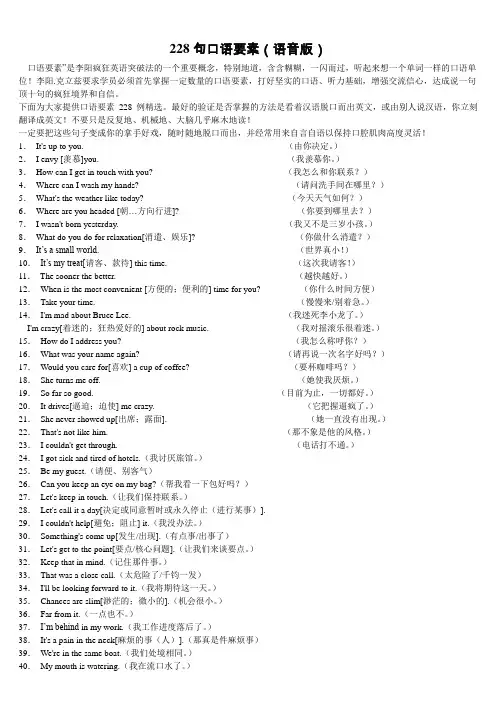
228句口语要素(语音版)口语要素”是李阳疯狂英语突破法的一个重要概念,特别地道,含含糊糊,一闪而过,听起来想一个单词一样的口语单位!李阳.克立兹要求学员必须首先掌握一定数量的口语要素,打好坚实的口语、听力基础,增强交流信心,达成说一句顶十句的疯狂境界和自信。
下面为大家提供口语要素228例精选。
最好的验证是否掌握的方法是看着汉语脱口而出英文,或由别人说汉语,你立刻翻译成英文!不要只是反复地、机械地、大脑几乎麻木地读!一定要把这些句子变成你的拿手好戏,随时随地脱口而出,并经常用来自言自语以保持口腔肌肉高度灵活!1.It's up to you. (由你决定。
)2.I envy [羡慕]you. (我羡慕你。
)3.How can I get in touch with you? (我怎么和你联系?)4.Where can I wash my hands? (请问洗手间在哪里?)5.What's the weather like today? (今天天气如何?)6.Where are you headed [朝…方向行进]? (你要到哪里去?)7.I wasn't born yesterday. (我又不是三岁小孩。
)8.What do you do for relaxation[消遣、娱乐]? (你做什么消遣?)9.It’s a small world. (世界真小!)10.It’s my treat[请客、款待] this time. (这次我请客!)11.The sooner the better. (越快越好。
)12.When is the most convenient [方便的;便利的] time for you? (你什么时间方便)13.Take your time. (慢慢来/别着急。
)14.I'm mad about Bruce Lee. (我迷死李小龙了。

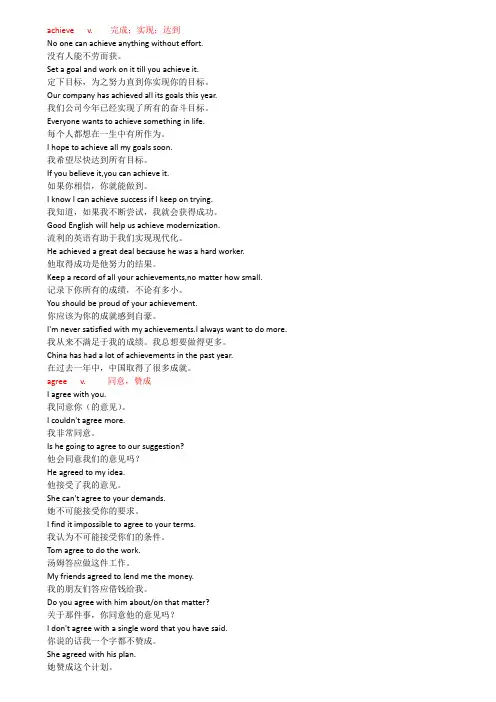
achieve v. 完成;实现;达到No one can achieve anything without effort.没有人能不劳而获。
Set a goal and work on it till you achieve it.定下目标,为之努力直到你实现你的目标。
Our company has achieved all its goals this year.我们公司今年已经实现了所有的奋斗目标。
Everyone wants to achieve something in life.每个人都想在一生中有所作为。
I hope to achieve all my goals soon.我希望尽快达到所有目标。
If you believe it,you can achieve it.如果你相信,你就能做到。
I know I can achieve success if I keep on trying.我知道,如果我不断尝试,我就会获得成功。
Good English will help us achieve modernization.流利的英语有助于我们实现现代化。
He achieved a great deal because he was a hard worker.他取得成功是他努力的结果。
Keep a record of all your achievements,no matter how small.记录下你所有的成绩,不论有多小。
You should be proud of your achievement.你应该为你的成就感到自豪。
I'm never satisfied with my achievements.I always want to do more. 我从来不满足于我的成绩。
我总想要做得更多。
China has had a lot of achievements in the past year.在过去一年中,中国取得了很多成就。
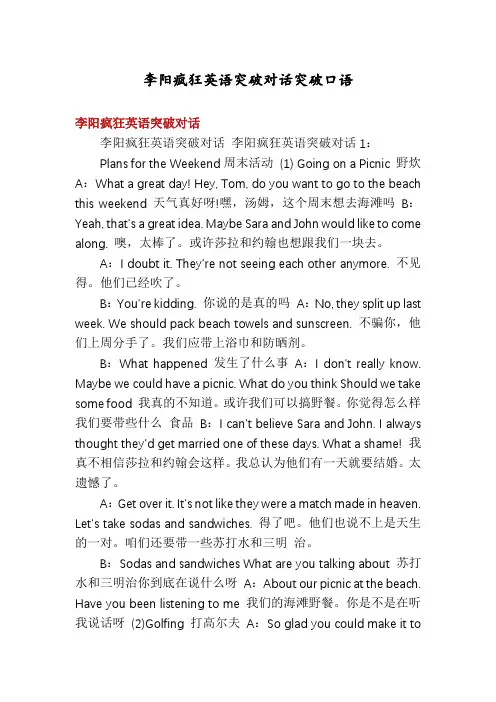
李阳疯狂英语突破对话突破口语李阳疯狂英语突破对话李阳疯狂英语突破对话李阳疯狂英语突破对话1:Plans for the Weekend周末活动(1) Going on a Picnic 野炊A:What a great day! Hey, Tom, do you want to go to the beach this weekend 天气真好呀!嘿,汤姆,这个周末想去海滩吗B:Yeah, that’s a great idea. Maybe Sara and John would like to come along. 噢,太棒了。
或许莎拉和约翰也想跟我们一块去。
A:I doubt it. They’re not seeing each other anymore. 不见得。
他们已经吹了。
B:You’re kidding. 你说的是真的吗A:No, they split up last week. We should pack beach towels and sunscreen. 不骗你,他们上周分手了。
我们应带上浴巾和防晒剂。
B:What happened 发生了什么事A:I don’t really know. Maybe we could have a picnic. What do you think Should we take some food 我真的不知道。
或许我们可以搞野餐。
你觉得怎么样我们要带些什么食品B:I can’t believe Sara and John. I always thought they’d get married one of these days. What a shame! 我真不相信莎拉和约翰会这样。
我总认为他们有一天就要结婚。
太遗憾了。
A:Get over it. It’s not l ike they were a match made in heaven. Let’s take sodas and sandwiches. 得了吧。
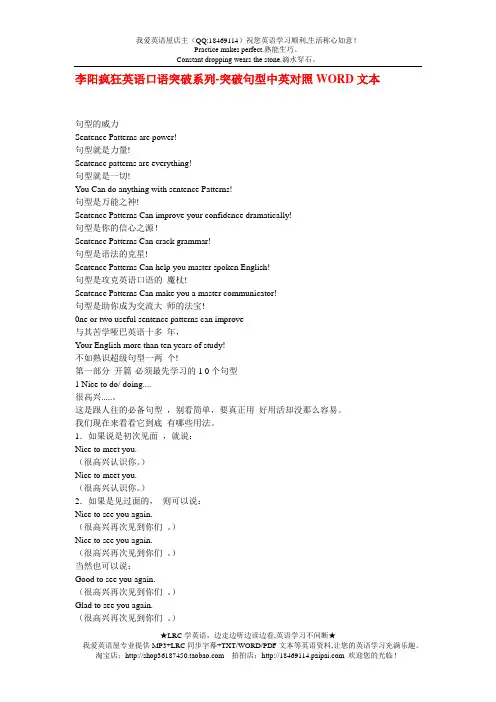
李阳疯狂英语口语突破系列-突破句型中英对照WORD文本句型的威力Sentence Patterns are power!句型就是力量!Sentence patterns are everything!句型就是一切!Y ou Can do anything with sentence Patterns!句型是万能之神!Sentence Patterns Can improve your confidence dramatically!句型是你的信心之源!Sentence Patterns Can crack grammar!句型是语法的克星!Sentence Patterns Can help you master spoken English!句型是攻克英语口语的魔杖!Sentence Patterns Can make you a master communicator!句型是助你成为交流大师的法宝!0ne or two useful sentence patterns can improve与其苦学哑巴英语十多年,Y our English more than ten years of study!不如熟识超级句型一两个!第一部分开篇-必须最先学习的1 0个句型1 Nice to do/ doing....很高兴.....。
这是跟人往的必备句型,别看简单,要真正用好用活却没那么容易。
我们现在来看看它到底有哪些用法。
1.如果说是初次见面,就说:Nice to meet you.(很高兴认识你。
)Nice to meet you.(很高兴认识你。
)2.如果是见过面的,则可以说:Nice to see you again.(很高兴再次见到你们。
)Nice to see you again.(很高兴再次见到你们。
)当然也可以说:Good to see you again.(很高兴再次见到你们。
)Glad to see you again.(很高兴再次见到你们。
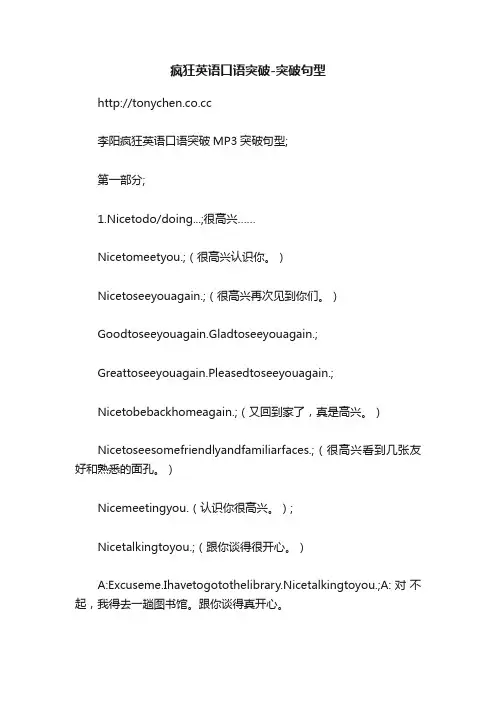
疯狂英语口语突破-突破句型李阳疯狂英语口语突破MP3突破句型;第一部分;1.Nicetodo/doing...;很高兴……Nicetomeetyou.;(很高兴认识你。
)Nicetoseeyouagain.;(很高兴再次见到你们。
)Goodtoseeyouagain.Gladtoseeyouagain.;Greattoseeyouagain.Pleasedtoseeyouagain.;Nicetobebackhomeagain.;(又回到家了,真是高兴。
)Nicetoseesomefriendlyandfamiliarfaces.;(很高兴看到几张友好和熟悉的面孔。
)Nicemeetingyou.(认识你很高兴。
);Nicetalkingtoyou.;(跟你谈得很开心。
)A:Excuseme.Ihavetogotothelibrary.Nicetalkingtoyou.;A:对不起,我得去一趟图书馆。
跟你谈得真开心。
B:Metoo.Seeyoulater!;B:我也是。
再见!A:Seeyou!A:再见!;2.Howis/was...?;……怎么样?第一节Howis…?;A:How''s/Howisyourfamily?;A:你的家人怎么样?B:Everyoneisdoinggreat.Howaboutyours?;B:都很好。
你的家人呢?A:How''s/Howisyourgirlfriend?;A:你女朋友怎么样?B:Didn''tyouhear?Webrokeupaweekago.;B:你没听说吗?我们一周前吹了。
A:How''s/Howisyourwork?;A:你的工作怎么样?B:I''mreallybusy.Ibarelyhavetimetositdown.;B:我太忙了,几乎连坐一下的时间都没有。
/lrcA:How''s/HowisyourEnglishstudy?;A:你英语学得怎么样了?B:Terrific.I''mreallymakingalotofprogress.It''samazing.;B:挺好。
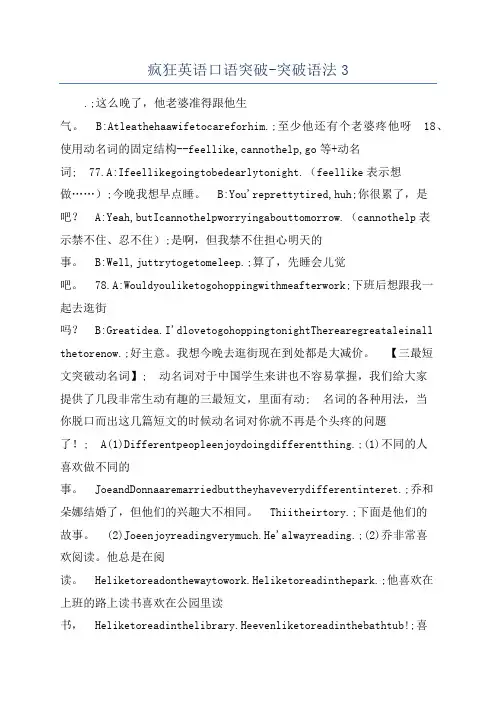
疯狂英语口语突破-突破语法3.;这么晚了,他老婆准得跟他生气。
B:Atleathehaawifetocareforhim.;至少他还有个老婆疼他呀18、使用动名词的固定结构--feellike,cannothelp,go等+动名词; 77.A:Ifeellikegoingtobedearlytonight.(feellike表示想做……);今晚我想早点睡。
B:You'reprettytired,huh;你很累了,是吧?A:Yeah,butIcannothelpworryingabouttomorrow.(cannothelp表示禁不住、忍不住);是啊,但我禁不住担心明天的事。
B:Well,juttrytogetomeleep.;算了,先睡会儿觉吧。
78.A:Wouldyouliketogohoppingwithmeafterwork;下班后想跟我一起去逛街吗?B:Greatidea.I'dlovetogohoppingtonightTherearegreataleinall thetorenow.;好主意。
我想今晚去逛街现在到处都是大减价。
【三最短文突破动名词】; 动名词对于中国学生来讲也不容易掌握,我们给大家提供了几段非常生动有趣的三最短文,里面有动; 名词的各种用法,当你脱口而出这几篇短文的时候动名词对你就不再是个头疼的问题了!; A(1)Differentpeopleenjoydoingdifferentthing.;(1)不同的人喜欢做不同的事。
JoeandDonnaaremarriedbuttheyhaveverydifferentinteret.;乔和朵娜结婚了,但他们的兴趣大不相同。
Thiitheirtory.;下面是他们的故事。
(2)Joeenjoyreadingverymuch.He'alwayreading.;(2)乔非常喜欢阅读。
他总是在阅读。
Heliketoreadonthewaytowork.Heliketoreadinthepark.;他喜欢在上班的路上读书喜欢在公园里读书,Heliketoreadinthelibrary.Heevenliketoreadinthebathtub!;喜欢在图书馆里读书。
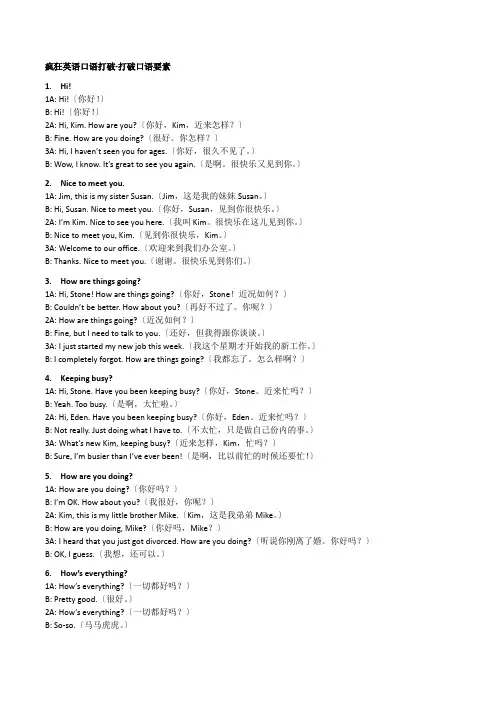
疯狂英语口语打破-打破口语要素1. Hi!1A: Hi!〔你好!〕B: Hi!〔你好!〕2A: Hi, Kim. How are you?〔你好,Kim,近来怎样?〕B: Fine. How are you doing?〔很好。
你怎样?〕3A: Hi, I haven’t seen you for ages.〔你好,很久不见了。
〕B: Wow, I know. It’s great to see you again.〔是啊。
很快乐又见到你。
〕2. Nice to meet you.1A: Jim, this is my sister Susan.〔Jim,这是我的妹妹Susan。
〕B: Hi, Susan. Nice to meet you.〔你好,Susan,见到你很快乐。
〕2A: I’m Kim. Nice to see you here.〔我叫Kim。
很快乐在这儿见到你。
〕B: Nice to meet you, Kim.〔见到你很快乐,Kim。
〕3A: Welcome to our office.〔欢迎来到我们办公室。
〕B: Thanks. Nice to meet you.〔谢谢。
很快乐见到你们。
〕3. How are things going?1A: Hi, Stone! How are things going?〔你好,Stone!近况如何?〕B: Couldn’t be better. How about you?〔再好不过了。
你呢?〕2A: How are things going?〔近况如何?〕B: Fine, but I need to talk to you.〔还好,但我得跟你谈谈。
〕3A: I just started my new job this week.〔我这个星期才开始我的新工作。
〕B: I completely forgot. How are things going?〔我都忘了。
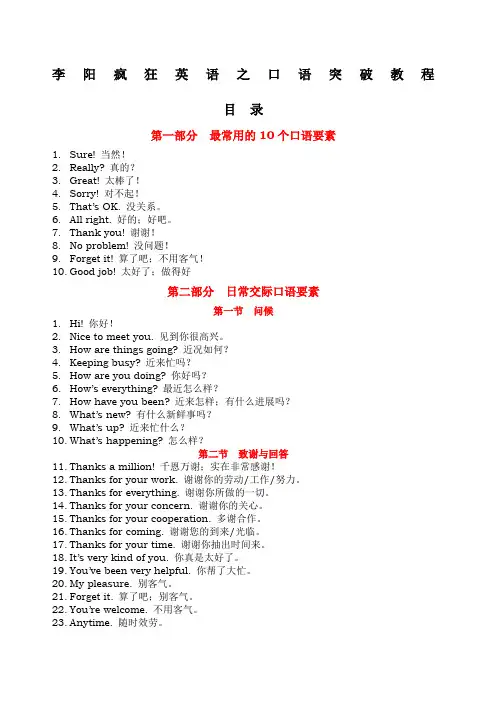
李阳疯狂英语之口语突破教程目录第一部分最常用的10个口语要素1.Sure! 当然!2.Really? 真的?3.Great! 太棒了!4.Sorry! 对不起!5.That’s OK. 没关系。
6.All right. 好的;好吧。
7.Thank you! 谢谢!8.No problem! 没问题!9.Forget it! 算了吧;不用客气!10.Good job! 太好了;做得好第二部分日常交际口语要素第一节问候1.Hi! 你好!2.Nice to meet you. 见到你很高兴。
3.How are things going? 近况如何?4.Keeping busy? 近来忙吗?5.How are you doing? 你好吗?6.How’s everything? 最近怎么样?7.How have you been? 近来怎样;有什么进展吗?8.What’s new? 有什么新鲜事吗?9.What’s up? 近来忙什么?10.What’s happening? 怎么样?第二节致谢与回答11.Thanks a million! 千恩万谢;实在非常感谢!12.Thanks for your work. 谢谢你的劳动/工作/努力。
13.Thanks for everything. 谢谢你所做的一切。
14.Thanks for your concern. 谢谢你的关心。
15.Thanks for your cooperation. 多谢合作。
16.Thanks for coming. 谢谢您的到来/光临。
17.Thanks for your time. 谢谢你抽出时间来。
18.It’s very kind of you. 你真是太好了。
19.You’ve been very helpful. 你帮了大忙。
20.My pleasure. 别客气。
21.Forget it. 算了吧;别客气。
22.You’re welcome. 不用客气。
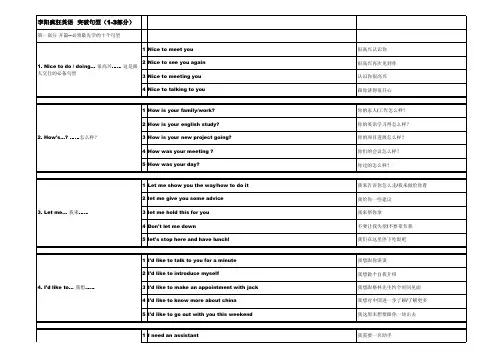
疯狂口语突破教程疯狂口语突破教程[1]第一讲Attitude is everything. 态度决定一切。
要学习地道的口语,就必须先掌握一定量的口语要素,只要能将它们灵活使用在你的语言中,你的口语水平就会得到很大的提升。
同时,在学习和应用它们的过程中,不要忘了随时纠正自己的发音。
口语要素11. It’s up to you.2. I envy you. I admire you.3. Where can I wash my hands?4. Where are you headed?5. I wasn’t born yesterday.6. It’s a small world.7. It’s my treat this time.8. The sooner the better.9. Take your time.10. I’m crazy about Bruce Lee. I’m crazy about rock music.11. It drives me crazy.12. Could you care for a cup of coffee?13. She turns me off.14. You make me sick!15. I got sick and tired of hotels.16. So far so good.17. She never showed up.18. That’s not like him.19. I couldn’t get through.20. Be my guest.21. Can you keep an eye on my bag?22. Let’s call it a day.23. I couldn’t help it.24. Something’s come up.25. Let’s get to the point.26. Keep that in mind.27. That was a close call.28. I’ll be looking forward to it.29. Don’t try any tricks.30. That’s the stupidest thing I’ve ever heard!TONGUE TWISTERS绕口令The hunter and his huge horse hid behind the house.Little Lily and Little Nelly are writing letters.PARAGRAPHYou must take a blow or give one.You must lose you must risk.Be a man and face the battle.It’s the only way to win.It takes a little courage and a little self-controlAnd some grim determination, if you want to reach the goal.Just do it: If you put off things for too long, they can easily become uncontrollable. The longer you wait to tackle a problem, the more difficult it becomes. Don’t waste time thinking about how difficult something is. Just take theadvice in this passage.Many people put off until tomorrow what they can do today. They always look for excuses to postpone doing something. In the end, it never gets done. If we leave things undone, wewill eventually worry. This will cause unnecessary stress. Therefore, if you have this bad habit, it’s best to get ridof it and do things as soon as possible.PROVERB & APHORISM谚语和警句1. Haste makes waste.2. An idle youth, a needy age.3. The morning sun never lasts a day.4. Strike while the iron is hot.5. Do nothing by halves.6. Wonders are many, and nothing is more wonderful thanman.7. The fox changes his skin but not his habits.。
《口语突破对话》PART 1:CORE DIALOGUES核心对话下面的十组对话是以日常生活中最常用的10个核心句子展开的。
这10句话虽然短小,却是使用频率最高、威力最大的超级句子,而以这10句话为基准的10组共20个对话,囊括了生活中最常见的场景。
你最想说的东西,全在这里了。
1、It’s Nice Meeting You. 很高兴见到你。
A: Hi, Stone. I’d like to introduce my friend, Lisa.嗨,石头。
我想介绍一下我的朋友,丽莎。
B: Hi, Lisa. It’s nice meeting you.嗨,丽莎。
很高兴认识你。
C: Nice meeting you, too, Stone.我也很高兴认识你,石头。
B: Lisa, you know, I’ve heard a lot about you.丽莎,你知道,我听说过许多关于你的事情。
C: Really? I hope it’s not anything bad about me.真的吗?希望不是关于我的坏事情。
B: Not at all. You are very popular. Everything I’ve heard has been good!根本不是。
你很受欢迎。
我听到的都是关于你的好事情!A: Hello, let me introduce myself. I’m your new neighbor. My name is Andy. 你好。
让我自我介绍一下。
我是你的新邻居,安迪。
B: Hi, Andy. I’m Judy. It’s nice meeting you.你好,安迪。
我叫朱迪。
很高兴认识你。
A: Nice meeting you, too.我也很高兴认识你。
B: Come over and visit when you have time. 有空过来聊聊天。
A: Thanks for the invitation. I will!邀请,我会的!介绍常用语I’d like to introduce my friend.我想介绍一下我的朋友。
李阳疯狂英语-- 突破语法We're sick of boring grammar! Grammar is just like a bottomless sea.;我们厌倦了枯燥的语法!语法如浩瀚的海洋,You are simply turned offonce you read a grammar book!;一拿起语法书,学习英语的兴趣荡然无存!We are sick of those sentences fabricated for grammar teaching.;我们厌倦了专门为语法造出来的句子!Once we leave the school,those lfeless sentences become sheer rubbish.;一离开教室那此句子就变成了垃圾,显得苍白无力Li Yang Crazy English gives you a brand new concept;;李阳疯狂英语给你一个全新的概念;Conquer English grammar through practical and beautiful sentences!;用最实用的句子、最精彩的对话全面突破语法难点Each grammar point is given vibrant,exciting dialogues or sentences;每条语法配数个生动、有趣的对话或句子!Just practice crazily and blurt it out! Throw away your boring grammar books!;疯狂操练,脱口而出!抛开无聊的语法书本,Forget about those dull grammar explanations!;摆脱乏味的语法解释,Put aside those sentences that even foreigners wonder at!;抛弃那此连外国人都不懂的句子!Grammar is no more than speaking!;学语法就是这么简单扼要!只不过是说说而已!We are both grammar experts and communication kings!;我们既是语法专家,更是沟通高手!第一章动词时态;I love grammar. I hated grammar before I will bea grammar master.;我爱一般现在时:我爱一般过去时:我爱一般将来时:I thought I would never learn grammar well.;我爱过去将来时:I'm working on my grammar now. I was struggling with my grammar .;我爱现在进行时:我爱过去进行时:I will be speaking with perfect grammar. I've studied grammar for ten years.;我爱将来进行时:我爱现在完成时:I had forgotten all the grammar I learned for exams.;我爱过去完成时:I've been studying grammar for ten years, but I still can't speak English.;我爱现在完成进行时:1、一般现在时--表示现在的特征或经常性动作;Top 1: I like English very much.; 我非常喜欢英语。
第一部分开篇--必须最先学的10个句型1. Nice to do / doing... 很高兴……这是跟人交往的必备句型,别看它很简单,要真正用好用活却没那么容易。
我们现在来看看它到底有哪些用法:①如果是初次见面,就说:Nice to meet you.(很高兴认识你。
)②如果是见过面的,则可以说:Nice to see you again.(很高兴再次见到你们。
)当然也可以说:Good to see you again.Glad to see you again.Great to see you again.Pleased to see you again.③外出旅行回来,你还可以说:Nice to be back home again.(又回到家了,真是高兴。
)Nice to see some friendly and familiar faces.(很高兴看到几张友好和熟悉的面孔。
)These are two sentences to use when you have returned from a trip. I always feel this way when I return from Hong Kong, even though it is not that far away!当你从外地回来的时候,这两个句子就能派上用场。
我从香港回来时,总会有这种感觉,尽管香港并不算很远。
④道别时,最好说一声:Nice meeting you.(认识你很高兴。
)⑤结束谈话时,说一声:Nice talking to you. (跟你谈得很开心。
)这句话相当于It’s been nice talking to you.【疯狂点评】这句话非常具有交际技巧性。
如果你感觉跟对方很谈得来,但因其它事情不得不结束谈话,用这句话来收场是最合适不过了。
但是另一方面,如果你发现对方跟你没什么共同语言,你巴不得趁早结束谈话,也可以用这句话来打发,它不仅不会伤到别人的自尊,而且会使你显得彬彬有礼,给人留下好印象。
A: Excuse me. I have to go to the library. Nice talking to you.B: Me too. See you later!A: See you!A: 再见!【疯狂总结】现在我们回过头来看看Nice to do…….和Nice doing……的用法区别,其实很简单,Nice to do……是见面时说的,而Nice doing…….是将要分别时说的.2. How is/was...? ……怎么样?问候语如同感情的催化剂,多一点关心,多一点温暖,友情也就不知不觉地变得更深,如果你不想给人一种冷冰冰的感觉,请务必掌握这个典型的问候句型。
第一节How is…?A: How’s / How is your family?B: Everyone is doing great. How about yours?A: 你的家人怎么样?B: 都很好。
你的家人呢?A: How’s / How is your girlfriend?B: Didn’t you hear? We broke up a week ago.A: 你女朋友怎么样?B: 你没听说吗?我们一周前吹了。
A: How’s / How is your work?B: I’m really busy. I barely have time to sit down.A: 你的工作怎么样?B: 我太忙了,几乎连坐一下的时间都没有。
A: How’s / How is your English study?B: Terrific. I’m really making a lot of progress. It’s amazing.A: 你英语学得怎么样了?B: 挺好。
我确实有了很大进步,简直是惊人。
A: How’s / How is everything?B: Couldn’t be better!A: 一切好吗?B: 再好不过了。
◆额外句型一:如果是问候一项正在进行的动作,则还可以用―How’s...going?‖这个句型。
A: How’s it going?B: Everything is going just great. And you?A: 进展怎么样了?B: 一切都不错。
你呢?B: It’s a disaster! We are so far behind, I doubt we’ll ever finish!A: 你们的新项目进展怎么样了?B: 简直是一场灾难!我们落后太远了,我怀疑我们到底能不能完成。
◆额外句型二:问候某个人的时候,则可以用―How’s...doing?‖这个句型。
A: How’s your sister doing?B: She’s doing great. Thanks.A: 你姐姐怎么样?B: 她很好,谢谢!第二节How Was..?A: How was your trip?B: It was fantastic. I really had a great time.A: 这次旅行怎么样?B: 太棒了!真的很愉快。
A: How was your vacation?B: Awful. It rained every day and my wife got sick.A: 假期过得愉快吗?B: 糟透了!天天下雨,而且我老婆病了。
A: How was your interview?B: My interview was super. I think I spoke better English than the man who interviewed me! A: 你的面试怎么样?B: 我的面试简直没得讲。
我想我的英语比那个面试我的人还强。
A: How was your TOEFL exam?B: Damn hard! I’m just glad it’s over.A: 你的托福考试考得怎么样?B: 太难了!我庆幸终于结束了。
【额外成就感】How was...?实在是太有用了,我们天天都离不开:How was your meeting?(你们的会议怎么样?)How was your day?(你过得怎么样?)How was your date?(你的约会怎么样?)How was your test?(你的考试怎么样?)How was your party?(你们的晚会怎么样?)How was your dinner?(你们的晚餐怎么样?)How was your nap?(你睡得怎么样?)How was your picnic?(你们的野餐怎么样?)【疯狂联想】句型也像人一样,有的是独生子女,有的是双胞胎,有的却有好几个兄弟姐妹,How is…..?/How was…..?/How’s…..going?/How’s…..doing?就是这种兄弟姐妹关系。
How is 可以缩写成How’s3. Let me... 我来……―Let me...‖是英语中最简单也是最常用的句型,通常用于你想做一件对对方有利的事,请求对方同意时,如―Let me show you the way.‖做人还是要主动一点,热情一点,这个句型不可不学。
Top 1: Let me help you.(我来帮你。
)Top 2: Let me show you how to do it.(我来做给你看。
)This sentence is one of the most useful sentences to offer assistance. It is always easier to show someone how to do something than it is to tell him.这个句子是向人提供帮助时最有用的句子。
演示给人家看总比告诉别人如何做要简单一些。
Top 3: Let me give you some advice.(我给你一些建议。
)Let me hold this for you.(我帮你拿吧!)Let me introduce myself.(我来介绍一下我自己。
)Let me drive you home.(我来送你回家。
)Let me tell you the truth.(我来告诉你事情的真相。
)Let me get the doctor.(我去叫医生。
)―Let me...‖的其它用法:①一时想不起来,可以说:Let me think.(我想一想。
)This sentence is great when you aren’t sure what to say next, or you can’t think of the right word in English. It makes you sound intelligent and deep. It’s much better than ―I don’t know.‖当你不知道接着说什么或者想不出一个正确的英文单词时,这个句子就很有用。
它会使你听起来很有头脑,很深沉。
比―I don’t know‖可要好几倍!②一时下不了决心,可以说:Let me see.(我想想看。
)③想满足一下自已的好奇心,可以说:Let me have a look.(让我看一看。
)Let me check.(我核对一下。
)⑤想试一试身手,可以说:Let me try.(我来试一试。
)If you don’t want to tell someone ―no‖ or ―I can’t‖ just use this sentence inst ead.如果你不想告诉别人―不‖或者―我不行‖,那就用这个句子吧!⑥和朋友告别时,可以说:Let me hear from you.(给我来信。
)⑦看看自已能不能答应别人,则可以说:Let me see if I will have time.(我看看有没有时间。
)⑧―Let me...‖有时还可用于警告,如:Let me catch you bullying my brother again.(下次再让我看到你欺负我兄弟的话,有你好看的。
)This is a classic threat sentence! It’s usually said with a fist raised in the air!这是一个经典的威胁句子!说这话的人常常会举起拳头。
⑨―Let me...‖后面除了跟动词,还可与副词或介词连用,如:Let me alone.(别碰我。
)Let me in.(让我进去。